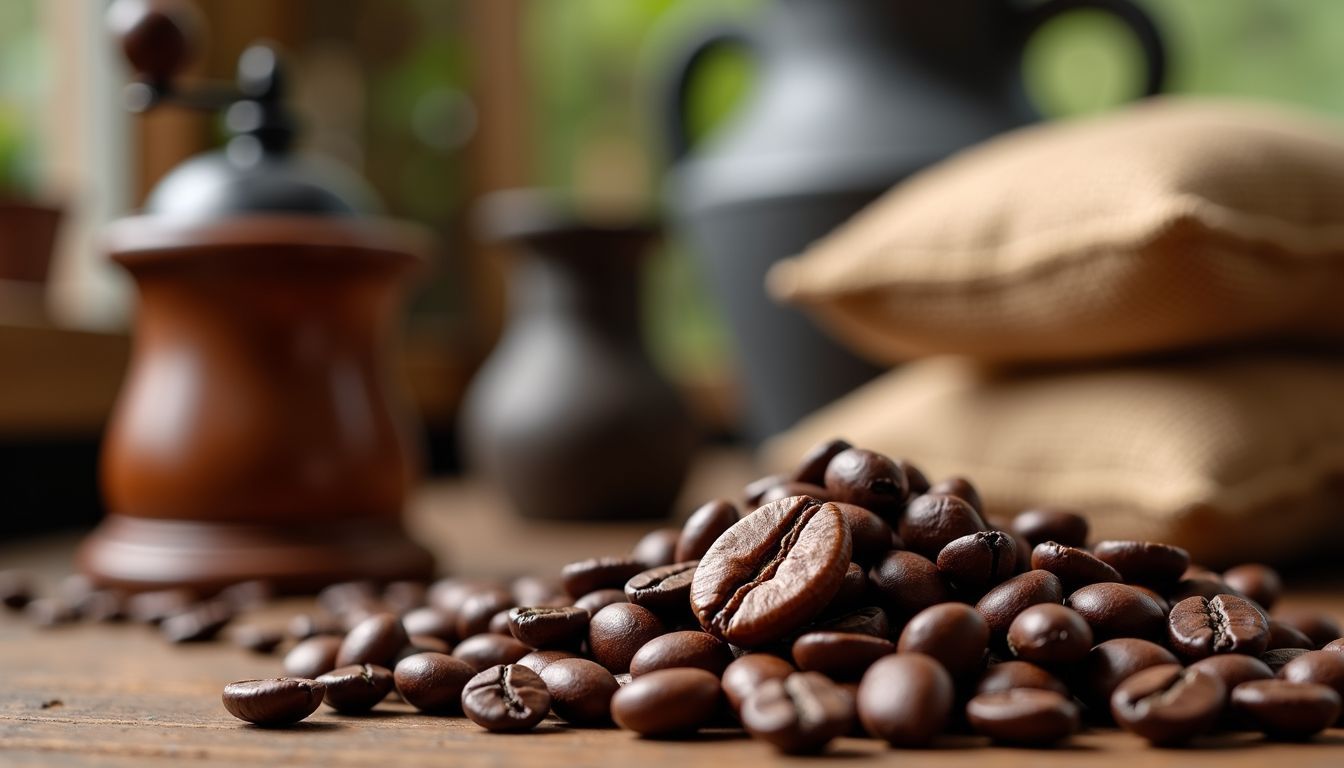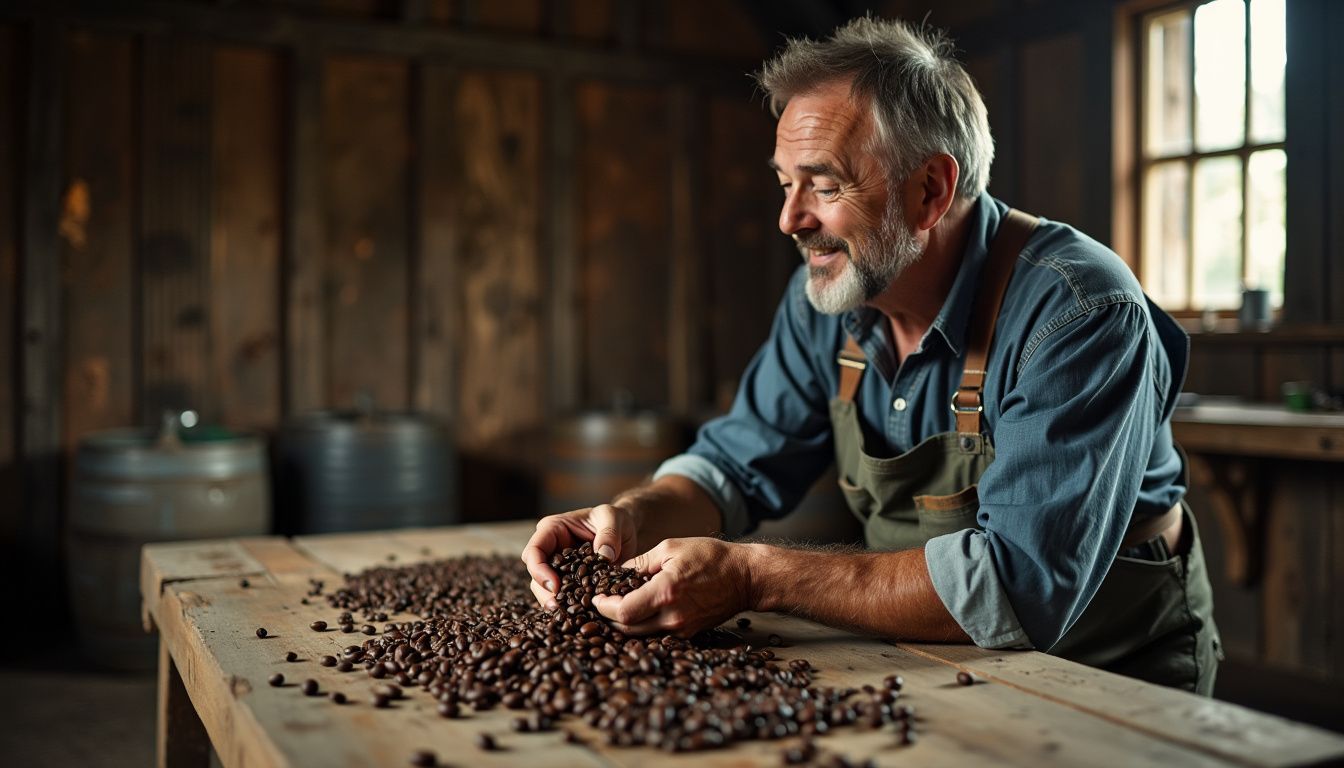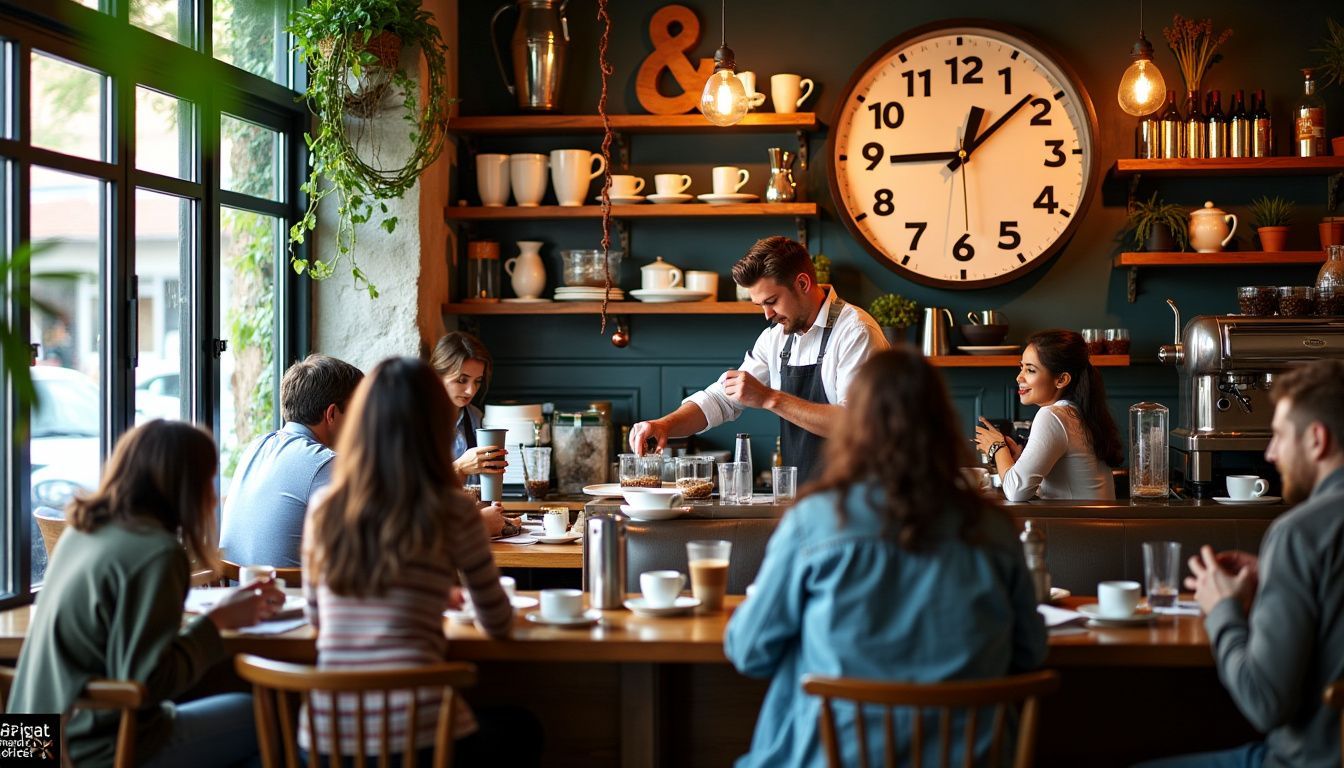What Is Specialty Coffee: Unveiling the World of Coffee Connoisseurship
Have an affection for coffee but find yourself puzzled over the notion of specialty coffee? You’re in good company. A common belief is that it’s simply an upscale version of standard coffee.
However, there’s a whole lot more to it. Specialty coffee distinguishes itself through its remarkable quality and the unique process from the plantation to your mug. This superior coffee variety introduces a novel twist into your morning routine.
Let’s give you some insight: Specialty coffee places at 80 points or higher on a 100-point basis by the Specialty Coffee Association (SCA). Having this score confirms that you’re tasting some of the best brews available.
Our article will lead you through its rich culture – from the careful selection of the beans to achieving the perfect home brew. Ready to elevate your coffee experience? Continue reading!
What Defines Specialty Coffee?

Specialty coffee stands out because of its high score on quality tests. This means it tastes better and is less bitter than regular beans you might find at the store.
Historical Background
Erna Knutsen first employed the term “specialty coffee” in 1974, prompting her to be referred to as the ‘godmother of specialty coffee.’ The coining of this phrase instigated an alternative perspective on coffee.
Prior to this, coffee was perceived merely as a beverage. Now, it is viewed as distinct flavours originating from diverse locations.
This shift prompted farmers and purchasers to pay keener attention to the quality aspect. They scrutinise the origin and growth conditions of the coffee. The taste properties of coffee from one region differ from those of coffee from another region.
Hence, specialising in coffee suggests that each cup offers rare flavours and aromas.
Quality Standards
Specialty coffee rates a minimum of 80 out of 100. This standard is set by the Specialty Coffee Association, also known as SCA. Coffees that earn between 90 to 100 fall into the “Outstanding” category.
Those scoring from 85 to 89.99 are defined as “Excellent”. And ones earning points from 80 to 84.99 are categorised as “Very Good”. Only a maximum of five defects per every 350 grams of beans are permissible.
Farmers handpick these coffee beans, ensuring they’re the perfect ripeness at harvest. Each bean contributes to the cumulative score and the ultimate quality of the coffee you savour.
Key Characteristics
Speciality coffee scores over 80 points. Experts called Q Graders test it for smell, taste, and other things. They pick beans with no defects and at their ripest. The main bean used is Arabica because it tastes better and is more sour than others.
Different methods like washed, natural, or honey change the coffee’s taste. These steps make sure the coffee you drink has top quality in every sip.

How Is Specialty Coffee Different from Regular Coffee?
Specialty coffee stands out because it meets high standards. Regular coffee might skip these steps.
Production Methods
Farmers grow specialty coffee in special climates and at high altitudes. They choose places like Brazil and Colombia for the best taste. The coffee comes from areas known for rich flavours.
Farmers focus on quality, picking beans with no defects at just the right time.
In making specialty coffee, people follow sustainable practices. They look after the environment and make sure farmers get fair treatment. This means using methods that are good for both land and workers.
High quality beans come from these careful processes.
Processing Techniques
Processing techniques really change how your coffee tastes. They include washed, honey, and natural methods. Each one has its own way of bringing out special flavours in the beans.
In washed processing, people clean the beans with water right away. This gets rid of fruity bits and leaves a clean taste. Honey processing is different. Here, some fruit is left on the bean while it dries.
This adds sweet and rich notes to your coffee. Natural processing goes another way entirely; beans dry inside their fruit, making the flavour deep and complex.
These methods help make specialty coffee stand out by highlighting unique tastes and aromas that you don’t find in regular coffee.
Roasting Considerations
The process of roasting specialty coffee beans requires considerable proficiency. Roasters employ scientific methods to extract the most delicious flavours. Attentiveness to the beans’ condition throughout the roasting process is fundamental.
This involves monitoring both the temperature and the duration of the roasting process, aiming for the ideal flavour profile.
Accomplishing this requires a substantial understanding of coffee chemistry and heat dynamics. Each variety of bean has its own unique roasting formula. Inappropriate temperature or duration may compromise the flavour.
Hence, a significant amount of effort is put in to perfect the process for your home-brewed coffee.

What Makes Specialty Coffee Unique and Desirable?
Speciality coffee distinguishes itself through its vivid tastes, delightful aroma, and creamy texture. It invites you to experience one-of-a-kind sensations with every sip. Envision it as entering a novel world of coffee experiences unavailable to you through regular blends.
Each batch is meticulously prepared from bean to cup, with a unique charm. If you are a flavoured coffee aficionado and hold quality in high regard, opting for speciality coffee becomes an obvious preference.
Are you prepared to experience the distinction?
Flavour Profiles
High-quality coffee is distinguished by its flavour. Professionals utilise a method known as cupping to identify these tastes, which involves meticulous tasting of the coffee to jot down all the diverse flavours.
Specialty coffees frequently originate from a single location, such as a specific farm or region within a country, lending each one a unique flavour. The geography and climatic conditions of each region contribute a distinct touch to the coffee.
The flavour spectrum of specialty coffee can astonish you with each experience. You might detect nuances of chocolate, fruits, or even floral notes in your brew. These flavours are a reflection of the conditions in which the coffee was cultivated and cared for before reaching your cup.
Factors such as altitude, weather, and soil composition greatly influence the flavour. Each sip is a narrative of the coffee’s journey from seed to cup.
Aroma Distinctions
Specialty coffee carries a distinctive aroma in comparison to other coffees. Its scent can be attributed to its growth conditions and the nature of the bean itself. For instance, Arabica beans, cultivated at high elevations, possess an exclusive fragrance that distinguishes them.
The unique aroma can be traced back to the soil and altitude at which they are grown, imbibing notes such as flowers or fruits.
Detecting the spectrum of coffee through its scent, even before one begins to taste it, discloses a lot. Every specialty coffee exudes a mix of aromas, hinging on its production and origin.
A certain breed might hint at chocolate or spices. This multiplicity in aromas provides a thrilling choice for your olfactory as well as gustatory senses when it comes to specialty coffee.
Textural Differences
Specialty coffee feels different in your mouth compared to regular coffee. It’s smoother and doesn’t leave a harsh aftertaste. Think of it like comparing silk to cotton. This smoothness comes from better beans and careful roasting.
Each sip should feel pleasant and clean, not bitter or rough.
These coffees also vary in thickness. Some might be light and easy to drink, like tea, while others are thick and creamy, almost like hot chocolate. This is due to the type of bean, where it’s grown, and how it’s roasted.

How Is Specialty Coffee Produced?
To make specialty coffee, farmers pay close attention to how they grow their crops. They pick the coffee fruits by hand when they are just right, then use special ways to clean and dry them before sending them off for roasting.
Farming Practices
Farmers grow special coffee in high places. They pick spots with just the right weather. Families that know a lot about farming do this work. They take great care of their coffee plants.
The goal is to get the best beans possible.
They choose special seeds for planting and make sure each plant gets enough water and sunlight. The farmers also use good soil to help the plants grow strong. When it’s time, they pick the coffee by hand to keep the quality high.
This way, every bean is perfect for making your favourite drink.
Harvesting Methods
In specialty coffee production, two main ways exist to pick coffee cherries. Selective harvesting is one method where workers hand-pick only the ripe cherries. This takes skill and care.
Each picker can collect up to 90 kg of ripe cherries in a day. The other method is strip harvesting. Machines or people quickly remove all cherries from a branch at once, both ripe and unripe.
Selective harvesting leads to higher quality coffee because only the best cherries make it into your cup. Strip harvesting is faster but mixes different maturity levels of cherries, affecting the taste.
Specialty coffee favours selective picking for its attention to detail and quality control.
Post-Harvest Processing
Following the collection of coffee beans, they require distinct attention to transform into the delightful beverage you appreciate. They undergo various processes such as rinsing or solar drying.
These techniques maintain the beans’ delicious flavour. For instance, some beans are promptly washed to remove their exterior coat. Conversely, a few might dry retaining this coat, introducing distinct tastes.
Imagine these procedures as cooking instructions modifying your coffee’s flavour. In situations where farmers allow beans to sun-dry without prior rinsing, your coffee may possess a sweet and fruity essence.
Conversely, if they cleanse the beans before drying, your coffee’s taste will be fresher and lighter. Each bean narrates a tale of its place of origin and the procedures it underwent post-harvest.

What Are the Key Factors in Evaluating Specialty Coffee?
When you pick specialty coffee, think about its acidity and body. Also, notice the different flavours you taste.
Acidity
Acidity is what gives specialty coffee its bright, lively quality. It’s like the sparkle in a fizzy drink. But not all acids are the same. In coffee, we love ones that taste crisp and clean—think of biting into a green apple or tasting a lemon zest.
These pleasing tastes come from good acids found in high-quality beans.
Experts use cupping to find out how much acidity is in coffee. This method lets them taste and score the coffee based on its acidity level. For example, coffees scoring 80 or above have just the right kind of acidity making them speciality grade.
So when you sip a cup of speciality coffee, enjoy the zingy taste—that’s acidity working its magic!
Body
Specialty coffee stands out because of its quality and unique taste. The experts pick the best green coffee beans with care. These beans come from special places like Ethiopia or Costa Rica, where the soil and climate make them taste better.
Think of these beans as the top players in a football team.
Roasting these beans is an art. Roasters control heat and time to bring out rich flavors, whether it’s for your morning espresso or a smooth latte at your favorite coffee shop. This process makes each sip special, unlike regular commercial coffee that often tastes the same.
Farming methods matter too. Farmers in countries near the Tropic of Cancer or Tropic of Capricorn grow these plants with love and attention. They pick coffee cherries by hand when they’re just right, making sure only high-quality ones make it into your cup.
Every step counts – from picking to roasting – to give you a special experience with every drink. You get more than just caffeine; you get a taste of different cultures and dedication all in one mug.
Flavour Notes
Flavour notes in coffee tell you about its taste. Each region gives coffee its own special flavour. For example, coffee from the Americas has a nutty and spicy taste with mild acidity.
Africa’s coffees are bright and fruity, with more acidity. Coffees from Asia taste earthy, chocolatey, and sweet with a heavy body. This means where your coffee comes from changes how it tastes.
Judges rate these flavours to see if a coffee is “speciality”. They look at aroma, body, and how sour or smooth it is too. So when you try different speciality coffees, you’re tasting notes from around the world!

Conclusion
Specialty coffee stands out because it’s all about quality. People work hard from farm to cup to make sure each bean is the best. This coffee grows in special places and goes through careful steps before you enjoy it.
When choosing specialty coffee, you taste flavours and smells that regular coffee doesn’t have. So, when you pick your next bag of coffee, think about going for specialty types. You’ll notice the difference and support good farming too.
